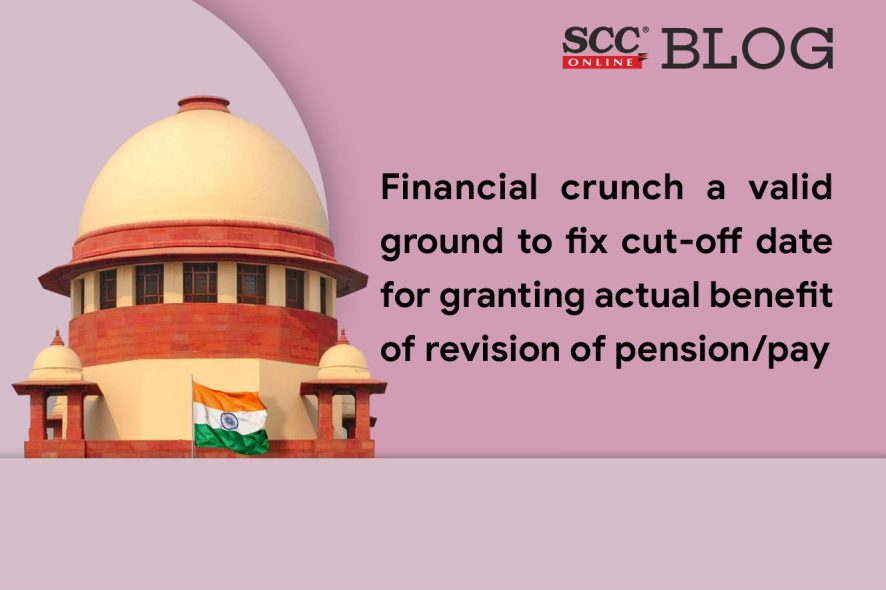Supreme Court: The bench of MR Shah* and BV Nagarathna, JJ has held that the financial crunch/financial constraint due to additional financial burden is a valid ground to fix a cut-off date for the purpose of granting the actual benefit of revision of pension/pay.
The Court was deciding the case relating to the validity of Rule 3(3) of the Tripura State Civil Services (Revised Pension) Rules, 2009 (Pension Rules, 2009), wherein the Tripura High Court had struck down the Rule and had directed to pay the original writ petitioner the arrears of pension for the period from 01.03.2007 to 31.12.2008.
On Government of India’s request to consider adoption and implementation of Revised Pay Structure in UGC System for Teachers in Colleges w.e.f. 01.01.2006 following revision of pay scales of Central Government employees as per 6th Central Pay Commission’s recommendations, the State of Tripura introduced revised pay structure with Band Pay Rs. 15600-39100 and 37400-67000 respectively with appropriate academic Grade Pay and it was specified that arrears would be payable subject to receipt of financial assistance of 80% from Central Government and that all other allowances to be admissible from 01.01.2009. The State’s notification also provided that the pension would be admissible as per Pension Rules for State as amended from time-to-time and the upper ceiling of pension was raised from Rs. 25200 to 38500. The State amended Rule 3(2) of the Pension Rules, 2009 in the year 2010 and the maximum limit of pension was fixed at Rs. 38500.
Rule 3(3) of the Pension Rules, 2009 which has been struck down by the High Court by the impugned judgment and order, is as under:
“3(3) The revised rate of pension within the above limits of minimum and maximum pension shall be computed notionally from 1st January 2006 or, as the case may be, from the date of superannuation/retirement whichever is later. But financial benefit according to this computation will be admissible from 1st January 2009 or from the date of superannuation/retirement whichever is later”
The same was challenged on the ground that there is no reasonable excuse to deny the actual benefit of pension for the period from 01.01.2006 to 31.12.2008 inasmuch as 80% of the financial requirement for implementation was to be borne by the Central Government whereas the State Government was to bear merely 20% of the entire requirement for making payment of the arrears of pension for the said period.
State, on the other hand, submitted that because of heavy financial burden and there being financial constraints, the State is not in a position to bear the heavy burden of additional revised pension and therefore, the State formulated a policy decision to the effect that the revised pension shall be paid from 9 01.01.2006 to 31.12.2008 notionally and actual revision of pension shall be disbursed from 01.01.2009 only.
The High Court refused to accept State’s plea of financial crunch struck down Rule 3(3) of the Pension Rules, 2009 being arbitrary and violative of Article 14 of the Constitution of India.
The Supreme Court, however, was not impressed with the approach of the High Court as it had, without giving any cogent reasons, observed that the foundation i.e., the financial crunch has not satisfied the Court at all.
The Supreme Court noted that when specific statistics were provided by the State before the High Court justifying its policy decision and the financial crunch/financial constraint was pleaded, there was no reason for the High Court to doubt the same.
The Court went on to hold that it was satisfied that a conscious policy decision was taken by the State Government to grant the benefit of revision of pension notionally from 01.01.2006 or from the date of superannuation till 31.12.2008 and to pay/grant the benefit of revision of pension actually from 01.01.2009, which was based on their financial crunch/financial constraint. To come to this conclusion, the Court relied on the decision in State of Punjab v. Amar Nath Goyal, (2005) 6 SCC 754 that financial constraint can be a valid ground for fixation of cut-off date for grant of benefit of increased quantum of death-cum-retirement gratuity.
Holding that the cut-off date has been fixed as 01.01.2009 on a very valid ground i.e., financial constraint, it was held that the High Court manifestly erred in striking down the Rule 3(3) of the Pension Rules, 2009 being arbitrary and violative of Article 14 of the Constitution and the decision was liable to be set aside.
However, noticing that the original writ petitioner has already been paid the arrears from the date of her retirement pursuant to the interim order passed by the Supreme Court, it has been directed that the same shall not be recovered from her.
[State of Tripura v. Anjana Bhattacharjee, 2022 SCC OnLine SC 1071, decided on 24.08.2022]
*Judgment by: Justice MR Shah
For State: Advocate Shuvodeep Roy







